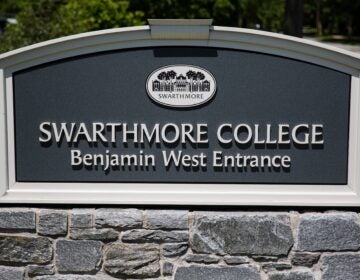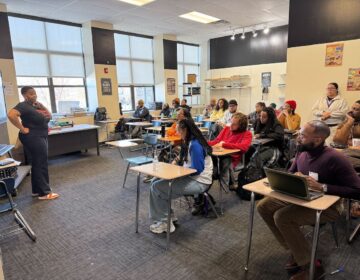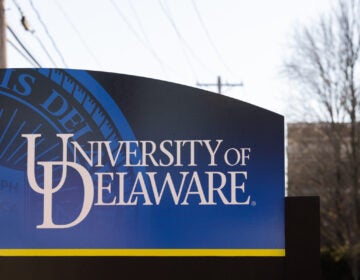Philly schools adopt five-year plan with minimal ‘ask’ of $30 million
-
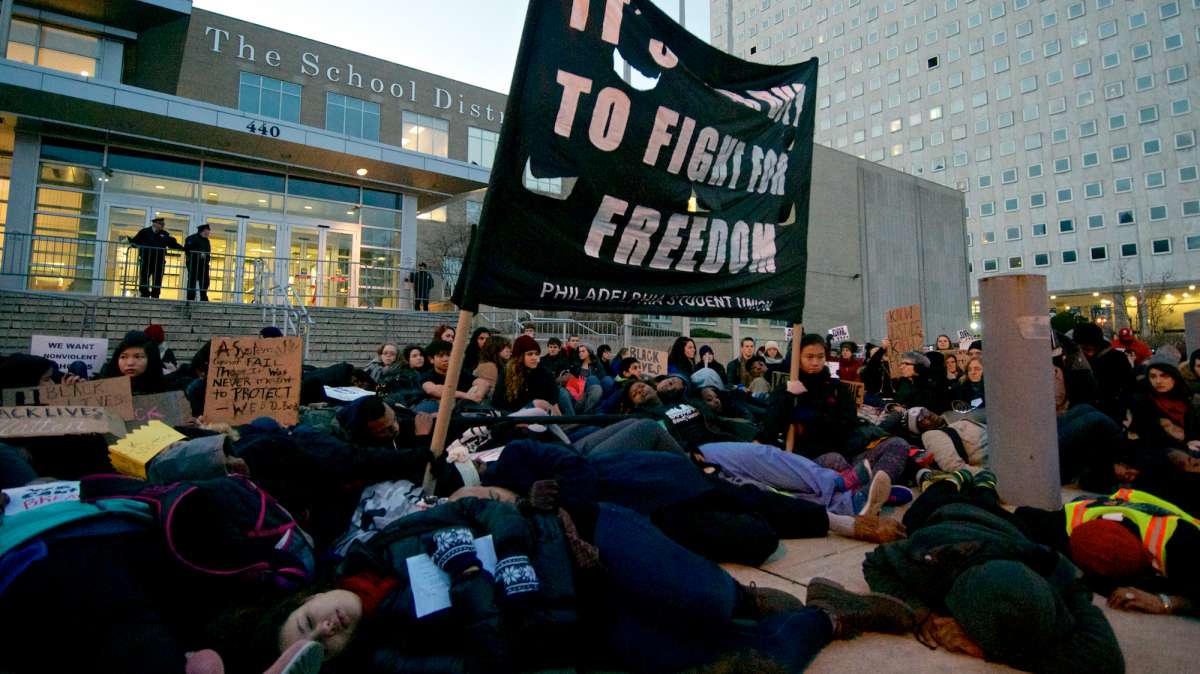
Students stage a 'Die-In' at the Philadelphia school administration building. (Bas Slabbers/for NewsWorks)
-
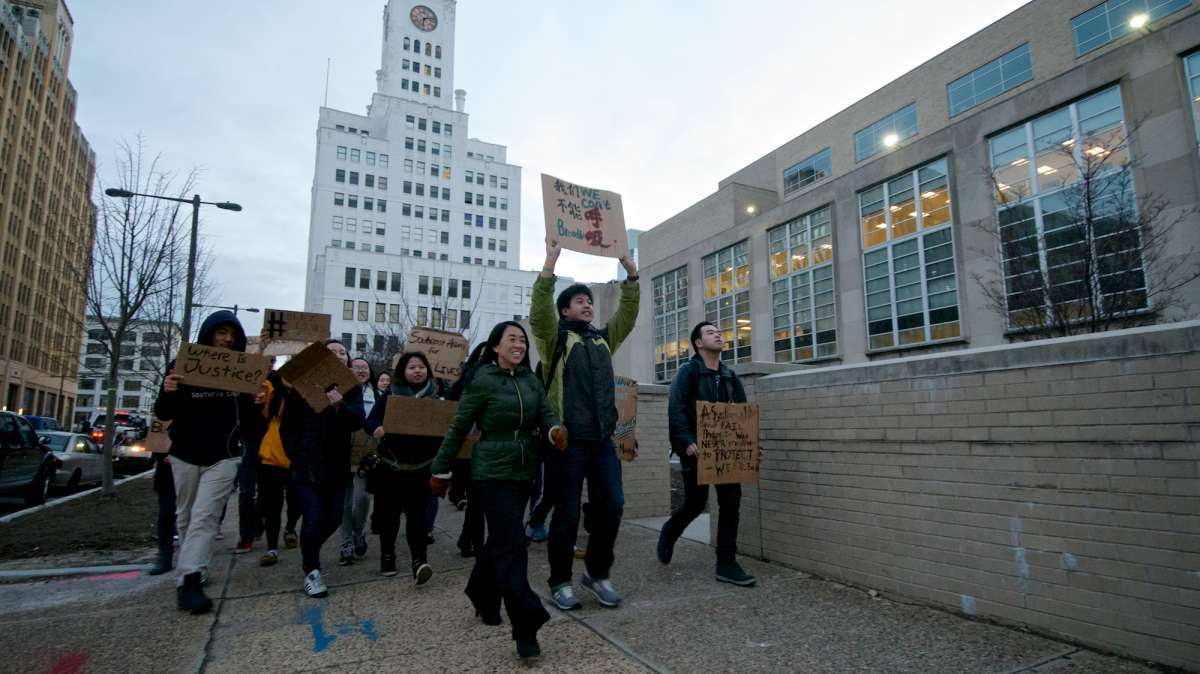
Marchers at the Philadelphia school administration building. (Bas Slabbers/for NewsWorks)
-
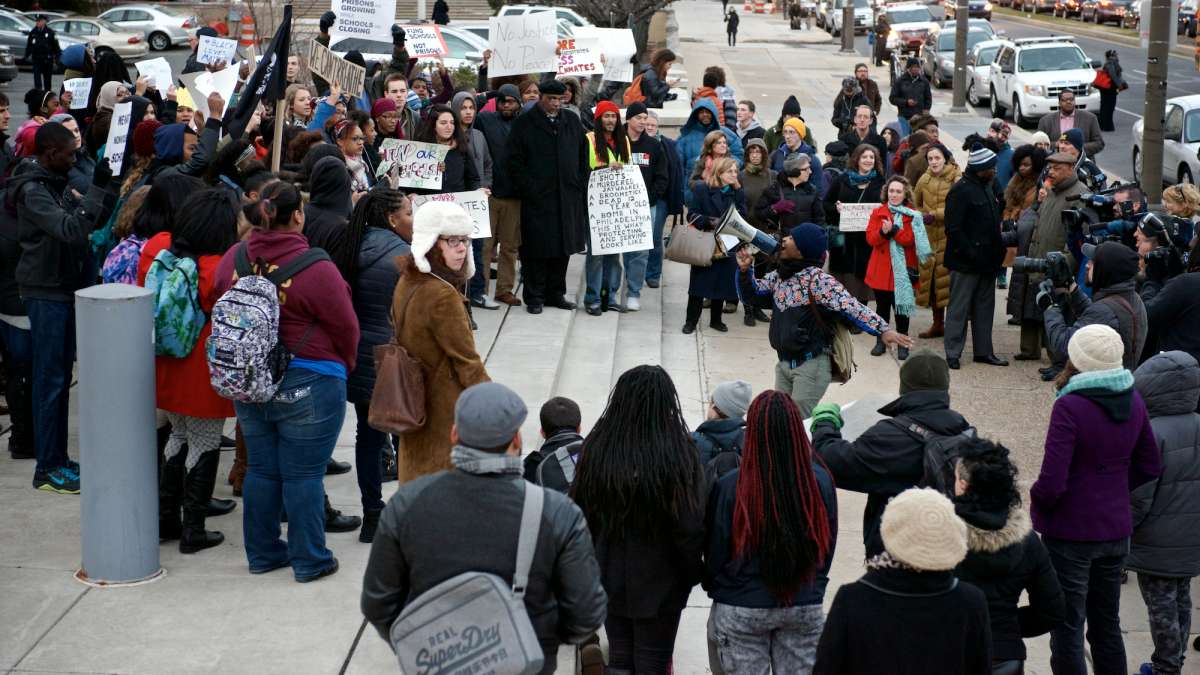
Before the SRC meeting Thursday night, protesters gathered on the steps of the districts administration building for a 'Die-in'. (Bas Slabbers/for NewsWorks)
To maintain the same “insufficient” progams being offered this year, the Philadelphia School District says it will need an additional $30 million in new, recurring revenues for next school year.
By 2018-19, the district says it’ll need an additional $152 million to avoid cutting back even further.
Presenting the district’s five-year plan at a School Reform Commission Meeting thursday evening, Superintendent William Hite explained that this is the district’s minimal request.
“Expenditures included in this plan are sufficient to keep schools open, but with far too few resources. It is a plan that does not meet the needs of all students,” Hite said in the report. “It merely represents the district’s commitment to live within its means.”
To actually create a school system where every student has “access to a quality education,” Hite says the district really needs $309 million next year, and $913 million by 2018-19.
With that kind of money, Hite says the district could ensure that “all students graduate college- and career-ready; all 8-year-olds read on grade level; and all schools have great principals and teachers.”
To meet this “transformative” funding commitment, the district is asking for $103 million from city and $206 million from the state.
Under this scenario, in the last year of the five-year plan, the district would ask for $304 million from the city and $608 million from the state.
These specific requests are coming much earlier in the budget process compared to previous years. Chief Financial Officer Matthew Stanski says the district hopes to give Mayor Michael Nutter, City Council and Governor-elect Tom Wolf adequate time to consider the district’s needs.
If the district received its full “transformative” ask for next year, its budget would be approximately $2.9 billion. In FY 11, the district’s budget was 2.8 billion.
After hearing a presentation from Stanski, the School Reform Commission approved the five-year plan by unanimous vote.
The district’s previous five-year financial plan was approved in September 2012, shortly after Hite assumed the top job.
Since then, the district executed a series of austerity measures that Hite says has put school finances on more stable ground, including: closing 24 schools, reducing central office spending to less than three percent of the district’s operating budget, and laying off 5,000 employees.
“The toll that many of these actions is taking on our students, families, and staff is profound,” wrote Hite.
“We can’t continue to cut our way to solvency,” said Stanski.
‘In conversations’
The district also negotiated more than $140 million in concessions from its blue collar and principal unions since adopting its last five year plan.
The district and the Philadelphia Federation of Teachers — whose contract expired August 2013 — haven’t held a bargaining session since July. A district spokesman says the parties are “in conversations.”
In October, the SRC voted to unilaterally terminate the teachers union contract and imposed health care concessions that it said would save $54 million this year and $200 million over four years.
The fate of the bulk of those dollars has been left in limbo as both parties await a Commonwealth Court judgement on the legality of the SRC’s action.
The district’s $30 million minimum request for next year assumes the court will rule in its favor. If not, its deficit would be $80 million.
The district’s status-quo proposal assumes PFT salaries remain frozen over five years, with a slight decrease in the workforce to match an expected enrollment dip.
At the SRC meeting, Stanski told chairman Bill Green that the “transformative” budget plan would allow for teacher salary increases.
In addition to realizing savings internally, the district has recently secured additional recurring revenues over $200 million through the authorization of the one percent sales tax increase and the $2 per pack Philadelphia cigarette tax.
Despite these actions, the district says its revenues simply continue falling short of its costs.
“There have been a lot of one-time fixes,” said Stanski in a briefing with reporters before the meeting – adding that “the mandated costs around pensions and charter payments are exceeding our revenues.”
Over the next five years, 86 percent of the district’s $282 million expenditure increase, will come from rising charter school costs, retirement costs, and debt payments.
The district counts on $15 million in building sales this year, but nothing in the years beyond.
Neither of the two plans — maintaining the status quo or transformation — assume any school closures over the next five years.
The status quo plan assumes that 5,500 more students will leave district schools for charters.
The transformation plan, which would, among other initiatives, include the creation of additional Renaissance charters, assumes 13,500 additional charter seats.
Wish list
In addition to its financial request, the five-year plan advocates for a wish-list of state and city policy changes, including reforming the state’s basic education and special-ed charter school funding mechanisms.
It calls for state lawmakers to create reforms that “more accurately reflect charter schools’ actual costs of serving special education students by including a sliding scale of rates based on disability.” If enacted, the district believes it would save more than $100 million in charter school expenditures.
Other policy changes advocated for include reforming the state pension formula, and creating a fair funding formula “that would include needed supports for more disadvantaged students, promote equity, and create consistency across Philadelphia and the state.”
The district also called on the city to continue doing a better job of collecting delinquent taxes.
The majority of the public comment at the meeting was related to the recent hearings the district held for the 40 applicants hoping to open new charter schools.
Parents testified for and against charter expansion.
Many of the pro-charter parents wore blue t-shirts that read “Power to the Parents” and advertised PhillySchoolChoice.com, a site run by the New Jersey-based education reform group Choice Media.
In addition to a slate of other resolutions, the SRC accepted a $650,000 grant from the Philadelphia School Partnership which will aide in the purchase of the Naviance college and career readiness tool, a web-based platform that will, among other things, allow high school students to take SAT-prep courses at drastically reduced rates.
Before the meeting students staged a die-in on the steps of district headquarters in honor of Laporshia Massey, a twelve year old who died last year. After having an asthma attack at an elementary school lacking a full-time nurse, she had been sent home and died shortly after.
WHYY is your source for fact-based, in-depth journalism and information. As a nonprofit organization, we rely on financial support from readers like you. Please give today.



